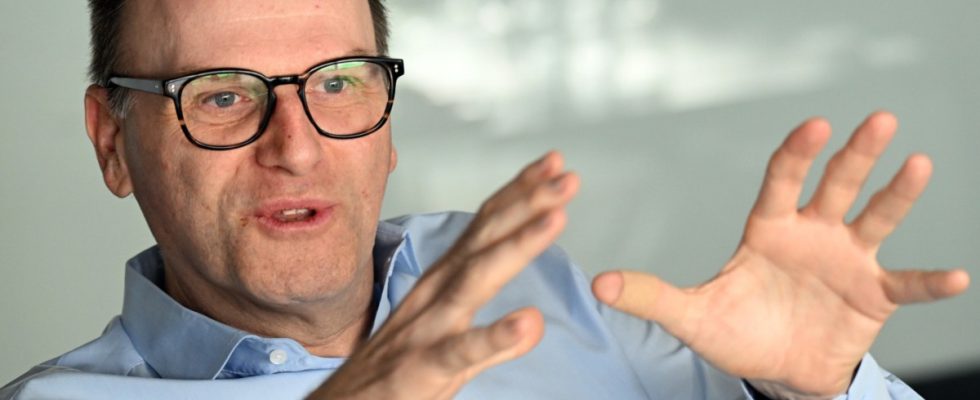The evidence was hard to miss: Boss Philippe Rogge, who only came into office in 2022, has to leave again at the end of March. And from this summer onwards, the new competitor 1&1 will be allowed to use its own network for a fee. Vodafone Germany, the most important branch of the British group, is financially strapped. The consequence: 2,000 of the approximately 15,000 jobs in Germany are to be eliminated – a good 13 percent of the workforce.
In total, there are savings of 400 million euros, not all of which should come from staff. According to outgoing boss Rogge, Vodafone Germany also wants to reduce material and operating costs. These included systems that were outdated or duplicated after company takeovers.
Hannes Ametsreiter led Vodafone’s business in Germany from 2015 to 2022.
(Photo: Johannes Simon)
Vodafone Germany has been in a process of change for years. Under Rogge’s predecessor, the Austrian Hannes Ametsreiter, many customers recently complained that, for example, full-bodied advertising promises were not kept when it came to landline connections. Ametsreiter took over the leadership position in 2015 and based the group’s advertising strategy on the term Giga. People don’t want to know anything about it today.
Vodafone wants to save and invest at the same time
His successor, the Belgian Rogge, took over a difficult inheritance from his predecessor Hannes Ametsreiter in the summer of 2022. During the Corona pandemic, the Internet lines that Vodafone had taken over with Kabel Deutschland and Unitymedia were suddenly used to capacity: many customers worked from home and spent their evenings at home streaming videos. But even after the end of the pandemic, Vodafone was barely able to keep up with the increased demands of its customers, despite significant investments in the overloaded network. As early as March 2023, just under a year after taking office, Rogge had to announce the first job cuts. 1,300 employees were affected at the time.
When it comes to cable networks, Vodafone is not only responsible for delivering the promised gigabyte speeds. A major challenge also arises from the fact that from July 1, 2024, tenants will no longer be billed for the costs of the cable TV connection in the additional rental costs. Tenants can choose how they want to receive TV. As the largest cable network operator in Germany, Vodafone is particularly affected because part of the TV business will no longer remain with Vodafone, but will be taken over by new competitors such as Waipu.tv or Zattoo. However, the loss of the additional cost privilege is not the reason for the new savings measures, argues Vodafone.
Vodafone doesn’t just want to save money, it also wants to invest money in digitization, expanding networks, improving customer service and developing new products. In the technology area, the previously separate customer support systems for cable connections and mobile communications are to be merged. At the same time, Vodafone wants to reduce its energy costs and carbon footprint with modern network technology.

